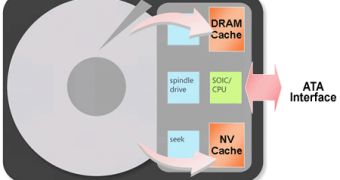There is a raging battle for the right to store your files and information. On the one side, please welcome the traditional hard disk drive with its spinning platters and not too great access speed, quite high power consumption and huge storage capabilities. On the other hand, please boooo! the solid state drive that offers faster access speeds, needs less power and is more resilient to high temperatures, shock and so on, while costing a small fortune and offering storage capabilities far behind those provided by the tried and true traditional HDD design.
For a while it looked as if there is a middle level solution between the two storage options and so the hybrid hard disk drive, HHD for short, was born. Unfortunately for both consumers and hardware manufacturers the HHD kind of fell flat on its face as it did not deliver the expected performance boost while retaining the great storage capabilities of the traditional design.
A hybrid hard disk drive is in fact a normal hard disk drive, HDD for short, that is coming from the factory with some additional cache memory based on flash memory chips that are supposed to act as a buffer and keep the continuously used data stored in there in order to provide greater access and read or write speeds.
According to the news site xbitlabs, hardware manufacturing companies were hoping that the hybrid design was going to bring together the best features of the both opposing storage solutions like fast data access speed, low power consumption, high storage capabilities and the ability to store important information in the flash memory indefinitely, which could provide computer systems with big performance boosts.
But the HHD failed to deliver and now both customers and manufacturing companies are looking at alternative designs. One solution might be to greatly increase the flash memory capacity that is integrated into the HHDs from the currently used 256MB to over 4GB which is expected that should grant them an important performance gain, but such a solution would most probably cost like crazy and most clients will not be in position to afford it.
''The initial versions haven't delivered the performance consumers expected,'' said Dr. Richard New, director of research for Hitachi Global Storage Technologies. According to that company the use of a HHD drive can cut the boot time from 28 seconds to 21 seconds but most users will not be interested in such a small advantage.

 14 DAY TRIAL //
14 DAY TRIAL //